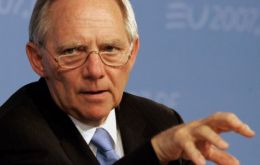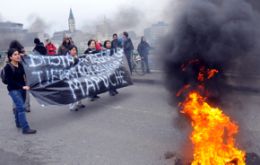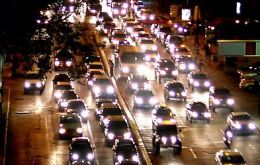MercoPress. South Atlantic News Agency
Stories for May 2010
-
Thursday, May 27th 2010 - 23:47 UTC
Argentina confirms poor squid season and closes fishery south of parallel 44

Argentina’s squid fishery to the south of parallel 44º was closed last Friday. The measure adopted by the Federal Fisheries Council (CFP) follows scientific information furnished by the National Institute for Fisheries Research and Development (INIDEP).
-
Thursday, May 27th 2010 - 09:27 UTC
Latinamerica must detach ‘utopia from true history and reality’

Renowned Peruvian writer Mario Vargas Llosa during a conference in Israel strongly criticized Latinamerican leaders such as Cuba’s Fidel Castro, Venezuela’s Hugo Chavez and Brazil’s Lula da Silva.
-
Thursday, May 27th 2010 - 09:18 UTC
Taiana admits Tories are ‘tougher’ on Malvinas but promises a ‘hot’ June

Argentine Foreign Affairs Minister Jorge Taiana admitted that the new conservative British government of PM David Cameron is taking ”a tougher stance” than its predecessors towards the Argentine claim on the Falkland/Malvinas Islands' sovereignty.
-
Thursday, May 27th 2010 - 09:15 UTC
Falklands happy as British Overseas Territory and ‘don’t like being told by others what to do’

The Falkland Islands are happy with the current status of British Overseas Territory, based on the right to self determination and do not like being told by others what to do, Falklands’ Legislative Assemble member Emma Edwards told a United Nations decolonization seminar held in New Caledonia.
-
Thursday, May 27th 2010 - 09:11 UTC
Argentina’s delay in dispatching imports is irritating trade partners

Since the controversial Argentine Interior Commerce Secretary Guillermo Moreno announced in an April 23 letter that he will examine overseas purchases to consider the competitiveness of the national market, products worth millions of dollars have been delayed at Argentina’s borders and ports.
-
Thursday, May 27th 2010 - 09:09 UTC
Germany preparing for “orderly state insolvency” in support of the Euro

Germany's push for an orderly insolvency process for indebted Euro zone states suggests Berlin is assuming the worst: that one of its peers -- most likely Greece -- will default on its debt repayments.
-
Thursday, May 27th 2010 - 09:03 UTC
Chile’s Mapuche community stops airport construction in Temuco

Santiago de Chile Appeals Court last week ruled in favour of Mapuche indigenous leaders to stop development of a new international airport near Temuco in the south of the country. The airport is located on ancestral lands belonging to the Mapuche.
-
Thursday, May 27th 2010 - 09:01 UTC
Brazil’s strong growth has budget primary surplus above target

The Brazilian central government posted in April its largest monthly primary budget surplus in two years on the back of solid economic growth, reversing two months of negative results, the Treasury said on Wednesday.
-
Thursday, May 27th 2010 - 08:51 UTC
More shadows than lights in Amnesty’s annual report on Argentina

Amnesty International (AI) expressed its “deep concern” regarding male violence towards women and the current prison situation in Argentina, where the evictions of indigenous communities from their ancestral lands was also denounced.
-
Thursday, May 27th 2010 - 08:49 UTC
Santiago’s streets congested with 42% of the total vehicles in Chile

More than one million vehicles circulate through Santiago’s streets, or 42% of the total vehicles in Chile. The expected increase of traffic in Chile’s capital, Santiago, is six percent for 2010, which will further increase traffic congestion and pollution particulary in winter months, experts say.
